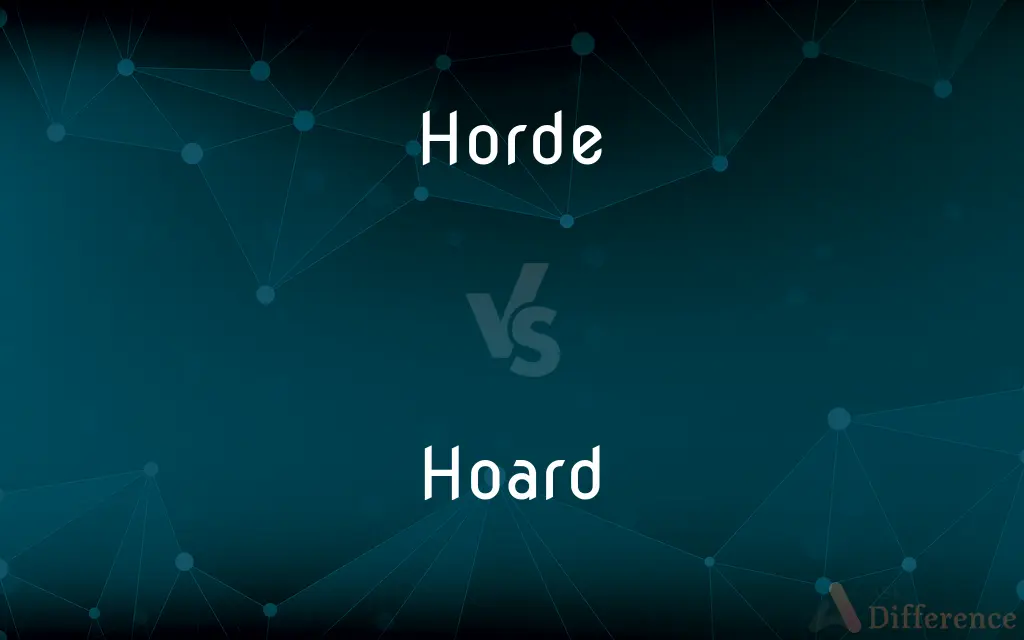Horde vs. Hoard — What's the Difference?
By Tayyaba Rehman — Updated on October 3, 2023
Horde refers to a large group of people, while Hoard means a stockpile or accumulated collection, often kept hidden.

Difference Between Horde and Hoard
Table of Contents
ADVERTISEMENT
Key Differences
Horde and Hoard, though similar in sound, have distinct meanings. A Horde pertains to a big crowd or mass of people, often moving together, while a Hoard is about accumulating items and often stashing them away.
In historical contexts, the term Horde has been used to describe nomadic groups or vast armies. Conversely, Hoard is more about the act of collecting, often fueled by the need or desire to conserve resources or valuables for future use.
If you visualize a bustling market, you might think of a Horde of shoppers bustling about. In the same setting, if a merchant has a stash of rare goods tucked away, that's his Hoard.
Literature and movies have given us scenes of Hordes of zombies or invaders. Similarly, tales of pirates or dragons often feature a Hoard of treasures kept hidden.
Lastly, to remember the difference, consider this: A Horde moves, often with intent or purpose, while a Hoard stays stationary, often concealed from others.
ADVERTISEMENT
Comparison Chart
Definition
A large group of people
A stockpiled collection
Usage
Describes moving masses
Describes accumulation
Common Context
Crowds, armies, mobs
Treasures, resources, stashes
Related Verbs
Swarm, gather
Accumulate, stockpile
Etymology
From Turkic "orda" (camp, army)
Old English "hord" (hidden stash)
Compare with Definitions
Horde
A large group of people.
The Horde of fans waited outside the concert hall.
Hoard
A hidden stock or store.
The dragon guarded its Hoard of gold.
Horde
An army or tribe of nomadic warriors.
Historians studied the movements of the Golden Horde.
Hoard
A collection gathered over time.
His Hoard of vintage stamps was impressive.
Horde
A throng or crowd with shared purpose.
A Horde of shoppers descended on the store for the sale.
Hoard
An accumulation for future use.
She kept a Hoard of snacks in her drawer.
Horde
A moving swarm or multitude.
A Horde of locusts devastated the crops.
Hoard
A secret stash kept away from others.
The squirrel had a Hoard of nuts buried underground.
Horde
A large group of people
A horde of beery rugby fans
Hoard
A hoard or "wealth deposit" is an archaeological term for a collection of valuable objects or artifacts, sometimes purposely buried in the ground, in which case it is sometimes also known as a cache. This would usually be with the intention of later recovery by the hoarder; hoarders sometimes died or were unable to return for other reasons (forgetfulness or physical displacement from its location) before retrieving the hoard, and these surviving hoards might then be uncovered much later by metal detector hobbyists, members of the public, and archaeologists.
Horde
A small loosely knit social group typically consisting of about five families.
Hoard
A stock or store of money or valued objects, typically one that is secret or carefully guarded
He came back to rescue his little hoard of gold
Horde
A large group or crowd; a swarm
A horde of mosquitoes.
Hoard
Accumulate (money or valued objects) and hide or store away
Thousands of antiques hoarded by a compulsive collector
Horde
A wandering troop or gang; especially, a clan or tribe of a nomadic people (originally Tatars) migrating from place to place for the sake of pasturage, plunder, etc.; a predatory multitude.
Hoard
A supply or store of something held or hidden for future use.
Horde
A large number of people or things.
We were beset by a horde of street vendors who thought we were tourists and would buy their cheap souvenirs.
Hoard
A collection or supply, as of memories or information, that one keeps to oneself for future use.
Horde
To travel en masse, to flock
Hoard
To accumulate a hoard of
Hoarded his money in a box under the bed.
Horde
A wandering troop or gang; especially, a clan or tribe of a nomadic people migrating from place to place for the sake of pasturage, plunder, etc.; a predatory multitude.
Hoard
To accumulate as much of (something) as one can, as when fearing a shortage.
Horde
Any large group of people or animals, especially one wandering or moving about; as, the movie star was surrounded by a horde of screaming fans.
Hoard
To keep hidden or private
"the impulse to hoard the raw material of experience and turn it into art" (Bernard Cooper).
Horde
A vast multitude
Hoard
To gather or accumulate a hoard.
Horde
A nomadic community
Hoard
A hidden supply or fund.
A hoard of provisions; a hoard of money
Horde
A moving crowd
Hoard
(archaeology) A cache of valuable objects or artefacts; a trove.
Horde
A mass gathering of similar entities.
A Horde of thoughts overwhelmed her mind.
Hoard
A hoarding temporary structure used during construction.
Hoard
A projecting structure (especially of wood) in a fortification, somewhat similar to and later superseded by the brattice.
Hoard
A hoarding billboard.
Hoard
To amass, usually for one's own private collection.
Hoard
See Hoarding, 2.
Hoard
A store, stock, or quantity of anything accumulated or laid up; a hidden supply; a treasure; as, a hoard of provisions; a hoard of money.
Hoard
To collect and lay up; to amass and deposit in secret; to store secretly, or for the sake of keeping and accumulating; as, to hoard grain.
Hoard
To lay up a store or hoard, as of money.
To hoard for those whom he did breed.
Hoard
A secret store of valuables or money
Hoard
Save up as for future use
Hoard
Get or gather together;
I am accumulating evidence for the man's unfaithfulness to his wife
She is amassing a lot of data for her thesis
She rolled up a small fortune
Hoard
A cache of valuable or rare items.
The archaeologists discovered a Hoard of ancient coins.
Common Curiosities
Can a Horde refer to animals?
Yes, it can mean a large group of animals, like a Horde of locusts.
Does Horde always imply disorder?
No, but it often suggests a large, possibly overwhelming group.
Why might someone Hoard items?
People Hoard for various reasons, including scarcity fears, sentimental value, or compulsive behavior.
Can you Hoard intangible things?
While typically about tangible items, it can be used metaphorically, like "Hoard memories."
How can I remember the difference between Horde and Hoard?
Think of a Horde as moving (like a crowd) and a Hoard as stored (like treasure).
Which is more transient, a Horde or a Hoard?
A Horde is more transient, often moving, while a Hoard is stationary.
Are Horde and Hoard homophones?
Yes, they sound similar but have different meanings.
Is a Hoard always hidden?
Not necessarily, but it often implies being kept away or stored.
Can you have a Horde of emotions?
Yes, used metaphorically, it can refer to an overwhelming multitude of emotions.
Is Horde used in historical contexts?
Yes, it can refer to nomadic groups or large armies in history.
Can Horde and Hoard be used as verbs?
Yes, "to Horde" means to gather in a horde, and "to Hoard" means to accumulate and store away.
Are there psychological conditions related to Hoard?
Yes, "hoarding disorder" is a recognized mental health condition.
Is the term Hoard only related to treasure?
No, it can be any accumulated collection, valuable or not.
Do both Horde and Hoard have Old English roots?
Horde's roots are in Turkic, while Hoard is from Old English.
Is a Hoard similar to a cache?
Yes, both refer to a collection or stockpile, though Hoard often implies more secrecy.
Share Your Discovery

Previous Comparison
Noticeable vs. Obvious
Next Comparison
Conflate vs. ConflagrateAuthor Spotlight
Written by
Tayyaba RehmanTayyaba Rehman is a distinguished writer, currently serving as a primary contributor to askdifference.com. As a researcher in semantics and etymology, Tayyaba's passion for the complexity of languages and their distinctions has found a perfect home on the platform. Tayyaba delves into the intricacies of language, distinguishing between commonly confused words and phrases, thereby providing clarity for readers worldwide.














































